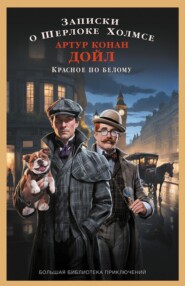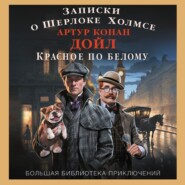По всем вопросам обращайтесь на: info@litportal.ru
(©) 2003-2025.
✖
Все приключения Шерлока Холмса. Сборник. Уровень 2
Настройки чтения
Размер шрифта
Высота строк
Поля
All night their course lay through intricate defiles and over and rock-strewn paths. More than once they lost their way, but Hope’s knowledge of the mountains enabled them to regain the track once more.
In the morning, a scene of marvellous though savage beauty lay before them. The rocky banks were on either side of them.
The sun rose slowly above the eastern horizon. The magnificent spectacle cheered the hearts of the three fugitives and gave them fresh energy. But Jefferson Hope was inexorable.
“They are following us,” he said. “Everything depends upon our speed. We must come to Carson.”
During the whole of that day they went on through the defiles, and by evening they were more than thirty miles from their enemies. At night-time they chose the cave, where the rocks offered some protection from the chill wind, and they enjoyed a few hours’ sleep. Before daybreak, however, they were up and on their way once more. They saw no signs of any pursuers, and Jefferson Hope began to think that they were out of the reach[60 - out of the reach – вне досягаемости] of the terrible organization. He little knew about its iron grasp.
About the middle of the second day their scanty store of provisions began to run out. The young hunter made a fire, at which his companions might warm themselves, for they were now nearly five thousand feet above the sea level.
He took his gun and walked for a couple of miles without success, though from the marks upon the bark of the trees, and other indications, he knew that there were numerous bears in the vicinity.
At last, on the edge of a pinnacle, three or four hundred feet above him, he saw a big-horn[61 - big-horn – снежный баран]. He rested his rifle upon a rock. The animal sprang into the air, and then came down into the valley beneath.
The creature was too heavy to carry, so the hunter cut one haunch and part of the flank. With this trophy over his shoulder, he hastened to go back. But he lost his way. He came to a mountain torrent. Night was coming on rapidly, and it was almost dark before he at last found the familiar defile. Even in the darkness he could recognize the outline of the cliffs which bounded it. He made a loud halloo as a signal that he was coming. He paused and listened for an answer. No answer came. Again he shouted, even louder than before, and again no whisper came back from his friends. A vague, nameless dread came over him.
When he turned the corner, he saw the spot. The same dead silence still reigned all round. There was no living creature near the remains of the fire: animals, man, maiden, all were gone.
Jefferson Hope was bewildered and stunned. However, he was a man of action, and speedily recovered from his temporary impotence. He seized a piece of wood from the fire, and examined the little camp. He saw the feet of horses. Near the camp was a heap of reddish soil. As the young hunter approached it, he perceived a stick with a sheet of paper. The inscription upon the paper was brief:
John Ferrier,
From Salt Lake City,
Died August 4th, 1860.
The sturdy old man was killed, then, and this was his epitaph. Jefferson Hope looked wildly round to see if there was a second grave, but there was no sign of one. Their terrible pursuers took Lucy with them back. She will be one of the harem of the Elder’s son.
And he decided at least to devote his life to revenge. He will devote his strong will and energy to that. With a grim, white face, he cooked some food. Then he took it and walked back through the mountains upon the track of the avenging angels.
On the sixth day, he reached the Eagle Ravine. He looked down upon the home of the Mormones. He was very exhausted. He observed that there were flags in some of the principal streets, and other signs of festivity. Then he heard the clatter of horse’s hoofs, and saw a horseman. He recognized a Mormon named Cowper, whom he knew before.
“I am Jefferson Hope,” he said. “You remember me.”
The Mormon looked at him with astonishment. Then the man’s surprise changed to consternation.
“You are mad to come here!” he cried. “I must not talk to you. There is a warrant against you from the Holy Four. You assisted the Ferriers.”
“I don’t fear them, or their warrant,” Hope said, earnestly. “You must know something, Cowper. We were friends. Please, don’t refuse to answer me.”
“What is it?” the Mormon asked uneasily. “Be quick. The rocks have ears and the trees have eyes.”
“How is Lucy Ferrier?”
“She was married yesterday to young Drebber.”
“Married, you say?” said Hope faintly. He was white.
“Married yesterday. There was a quarrel between young Drebber and young Stangerson. Stangerson shot her father; but when they argued, the Prophet gave her over to him. You know, I saw death in her face yesterday. She is more like a ghost than a woman. Are you going away, then?”
“Yes, I am going away,” said Jefferson Hope.
“Where are you going?”
“Never mind,” he answered; and went away into the heart of the mountains.
The prediction of the Mormon was right. Poor Lucy was sick and died within a month. Her sottish husband did not affect any grief at his bereavement; but his other wives mourned over her. They were grouped round the bier in the morning, when, to their inexpressible fear and astonishment, the door opened, and a savage-looking man in tattered garments came into the room. Without a word, he walked up to the white silent figure of Lucy Ferrier. He stooped over her, and pressed his lips reverently to her cold forehead. Then he took the wedding-ring from her finger.
“She will not be buried in that,” he cried with a fierce snarl, and sprang down the stairs and was gone.
For some months Jefferson Hope lingered among the mountains. He was leading a strange wild life, and nursing in his heart the fierce desire for vengeance which possessed him.
Once a bullet whistled through Stangerson’s window and flattened itself upon the wall. On another occasion, as Drebber passed under a cliff a great boulder crashed down on him, and he only escaped a terrible death because he threw himself upon his face. The two young Mormons repeated expeditions into the mountains, they hoped to capture or kill their enemy, but always without success.
The hunter soon realized that even his iron constitution could not stand the incessant strain. And he returned to the old Nevada mines, to recruit his health and to amass money enough to allow him to pursue his object.
He was absent for five years. At the end of that time, however, disguised, and under an assumed name, he returned to Salt Lake City. There he learned some news. There was a schism among the Chosen People a few months before. Some of the younger members of the Church rebelled against the authority of the Elders, and some malcontents left Utah and became Gentiles. Among these were Drebber and Stangerson. They said that Drebber was a wealthy man, while his companion, Stangerson, was comparatively poor. But where did they go?
Jefferson Hope never abandoned his thought of revenge. He travelled from town to town through the United States in quest of his enemies. Years passed, and at last his perseverance was rewarded. He found Drebber in Cleveland, Ohio. And Drebber recognized him as well. He came to the court, with Stangerson, who was his private secretary, and said that they were in danger of their lives from the jealousy and hatred of an old rival. That evening they took Jefferson Hope into custody[62 - into custody – под стражу] for some weeks. And Drebber and his secretary departed for Europe.
Again the avenger’s hatred urged him to continue the pursuit. He was working and saving every dollar for his journey. At last, he departed for Europe, and tracked his enemies from city to city. Finally, they came to London. What occurred there? We will quote the old hunter’s own account. They were duly recorded in Dr. Watson’s Journal.
Chapter VI
A Continuation of the Reminiscences of John Watson, M.D
Our prisoner smiled.
“I guess you’re going to take me to the police-station,” he remarked to Sherlock Holmes. “My cab’s at the door. If you’ll loose my legs I’ll walk down to it.”
Gregson and Lestrade exchanged glances; but Holmes loosened the towel.
“If there’s a vacant place for a chief of the police, I can recommend this man,” said Jefferson Hope, while he was gazing at Sherlock Holmes.
“Please come with me,” said Holmes to the two detectives.
“I can drive you,” said Lestrade.
“Good! And Gregson can come inside. You too, Doctor.”
I assented gladly, and we all descended together. Our prisoner stepped calmly into the cab. Lestrade whipped up the horse, and brought us in a very short time to our destination. A police Inspector wrote down our prisoner’s name and the names of the murdered men.
“The prisoner will be put before the magistrates in the course of the week,” said the Inspector; “in the mean time, Mr. Jefferson Hope, have you anything to say? I must warn you that your words may be used against you.”
“Yes, I want to say something,” our prisoner said slowly. “I want to tell you gentlemen all about it.”
“Why not in the court?” asked the Inspector.
In the morning, a scene of marvellous though savage beauty lay before them. The rocky banks were on either side of them.
The sun rose slowly above the eastern horizon. The magnificent spectacle cheered the hearts of the three fugitives and gave them fresh energy. But Jefferson Hope was inexorable.
“They are following us,” he said. “Everything depends upon our speed. We must come to Carson.”
During the whole of that day they went on through the defiles, and by evening they were more than thirty miles from their enemies. At night-time they chose the cave, where the rocks offered some protection from the chill wind, and they enjoyed a few hours’ sleep. Before daybreak, however, they were up and on their way once more. They saw no signs of any pursuers, and Jefferson Hope began to think that they were out of the reach[60 - out of the reach – вне досягаемости] of the terrible organization. He little knew about its iron grasp.
About the middle of the second day their scanty store of provisions began to run out. The young hunter made a fire, at which his companions might warm themselves, for they were now nearly five thousand feet above the sea level.
He took his gun and walked for a couple of miles without success, though from the marks upon the bark of the trees, and other indications, he knew that there were numerous bears in the vicinity.
At last, on the edge of a pinnacle, three or four hundred feet above him, he saw a big-horn[61 - big-horn – снежный баран]. He rested his rifle upon a rock. The animal sprang into the air, and then came down into the valley beneath.
The creature was too heavy to carry, so the hunter cut one haunch and part of the flank. With this trophy over his shoulder, he hastened to go back. But he lost his way. He came to a mountain torrent. Night was coming on rapidly, and it was almost dark before he at last found the familiar defile. Even in the darkness he could recognize the outline of the cliffs which bounded it. He made a loud halloo as a signal that he was coming. He paused and listened for an answer. No answer came. Again he shouted, even louder than before, and again no whisper came back from his friends. A vague, nameless dread came over him.
When he turned the corner, he saw the spot. The same dead silence still reigned all round. There was no living creature near the remains of the fire: animals, man, maiden, all were gone.
Jefferson Hope was bewildered and stunned. However, he was a man of action, and speedily recovered from his temporary impotence. He seized a piece of wood from the fire, and examined the little camp. He saw the feet of horses. Near the camp was a heap of reddish soil. As the young hunter approached it, he perceived a stick with a sheet of paper. The inscription upon the paper was brief:
John Ferrier,
From Salt Lake City,
Died August 4th, 1860.
The sturdy old man was killed, then, and this was his epitaph. Jefferson Hope looked wildly round to see if there was a second grave, but there was no sign of one. Their terrible pursuers took Lucy with them back. She will be one of the harem of the Elder’s son.
And he decided at least to devote his life to revenge. He will devote his strong will and energy to that. With a grim, white face, he cooked some food. Then he took it and walked back through the mountains upon the track of the avenging angels.
On the sixth day, he reached the Eagle Ravine. He looked down upon the home of the Mormones. He was very exhausted. He observed that there were flags in some of the principal streets, and other signs of festivity. Then he heard the clatter of horse’s hoofs, and saw a horseman. He recognized a Mormon named Cowper, whom he knew before.
“I am Jefferson Hope,” he said. “You remember me.”
The Mormon looked at him with astonishment. Then the man’s surprise changed to consternation.
“You are mad to come here!” he cried. “I must not talk to you. There is a warrant against you from the Holy Four. You assisted the Ferriers.”
“I don’t fear them, or their warrant,” Hope said, earnestly. “You must know something, Cowper. We were friends. Please, don’t refuse to answer me.”
“What is it?” the Mormon asked uneasily. “Be quick. The rocks have ears and the trees have eyes.”
“How is Lucy Ferrier?”
“She was married yesterday to young Drebber.”
“Married, you say?” said Hope faintly. He was white.
“Married yesterday. There was a quarrel between young Drebber and young Stangerson. Stangerson shot her father; but when they argued, the Prophet gave her over to him. You know, I saw death in her face yesterday. She is more like a ghost than a woman. Are you going away, then?”
“Yes, I am going away,” said Jefferson Hope.
“Where are you going?”
“Never mind,” he answered; and went away into the heart of the mountains.
The prediction of the Mormon was right. Poor Lucy was sick and died within a month. Her sottish husband did not affect any grief at his bereavement; but his other wives mourned over her. They were grouped round the bier in the morning, when, to their inexpressible fear and astonishment, the door opened, and a savage-looking man in tattered garments came into the room. Without a word, he walked up to the white silent figure of Lucy Ferrier. He stooped over her, and pressed his lips reverently to her cold forehead. Then he took the wedding-ring from her finger.
“She will not be buried in that,” he cried with a fierce snarl, and sprang down the stairs and was gone.
For some months Jefferson Hope lingered among the mountains. He was leading a strange wild life, and nursing in his heart the fierce desire for vengeance which possessed him.
Once a bullet whistled through Stangerson’s window and flattened itself upon the wall. On another occasion, as Drebber passed under a cliff a great boulder crashed down on him, and he only escaped a terrible death because he threw himself upon his face. The two young Mormons repeated expeditions into the mountains, they hoped to capture or kill their enemy, but always without success.
The hunter soon realized that even his iron constitution could not stand the incessant strain. And he returned to the old Nevada mines, to recruit his health and to amass money enough to allow him to pursue his object.
He was absent for five years. At the end of that time, however, disguised, and under an assumed name, he returned to Salt Lake City. There he learned some news. There was a schism among the Chosen People a few months before. Some of the younger members of the Church rebelled against the authority of the Elders, and some malcontents left Utah and became Gentiles. Among these were Drebber and Stangerson. They said that Drebber was a wealthy man, while his companion, Stangerson, was comparatively poor. But where did they go?
Jefferson Hope never abandoned his thought of revenge. He travelled from town to town through the United States in quest of his enemies. Years passed, and at last his perseverance was rewarded. He found Drebber in Cleveland, Ohio. And Drebber recognized him as well. He came to the court, with Stangerson, who was his private secretary, and said that they were in danger of their lives from the jealousy and hatred of an old rival. That evening they took Jefferson Hope into custody[62 - into custody – под стражу] for some weeks. And Drebber and his secretary departed for Europe.
Again the avenger’s hatred urged him to continue the pursuit. He was working and saving every dollar for his journey. At last, he departed for Europe, and tracked his enemies from city to city. Finally, they came to London. What occurred there? We will quote the old hunter’s own account. They were duly recorded in Dr. Watson’s Journal.
Chapter VI
A Continuation of the Reminiscences of John Watson, M.D
Our prisoner smiled.
“I guess you’re going to take me to the police-station,” he remarked to Sherlock Holmes. “My cab’s at the door. If you’ll loose my legs I’ll walk down to it.”
Gregson and Lestrade exchanged glances; but Holmes loosened the towel.
“If there’s a vacant place for a chief of the police, I can recommend this man,” said Jefferson Hope, while he was gazing at Sherlock Holmes.
“Please come with me,” said Holmes to the two detectives.
“I can drive you,” said Lestrade.
“Good! And Gregson can come inside. You too, Doctor.”
I assented gladly, and we all descended together. Our prisoner stepped calmly into the cab. Lestrade whipped up the horse, and brought us in a very short time to our destination. A police Inspector wrote down our prisoner’s name and the names of the murdered men.
“The prisoner will be put before the magistrates in the course of the week,” said the Inspector; “in the mean time, Mr. Jefferson Hope, have you anything to say? I must warn you that your words may be used against you.”
“Yes, I want to say something,” our prisoner said slowly. “I want to tell you gentlemen all about it.”
“Why not in the court?” asked the Inspector.

















